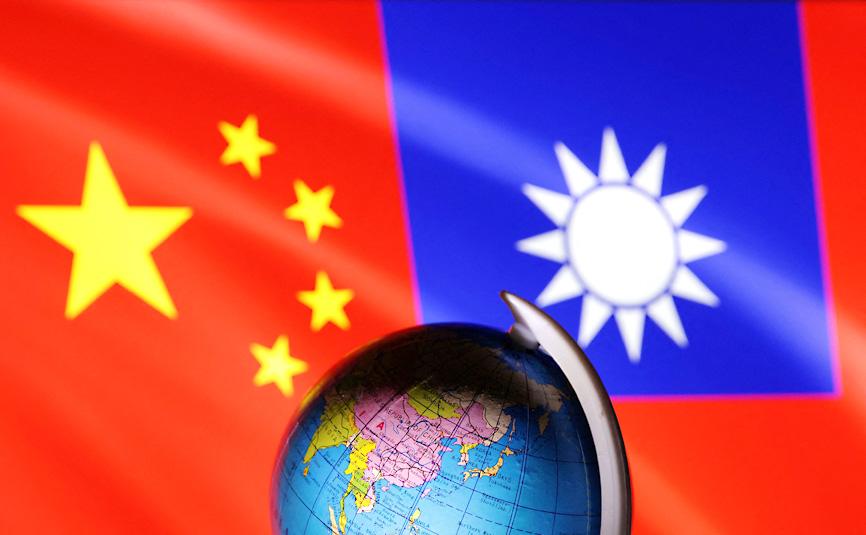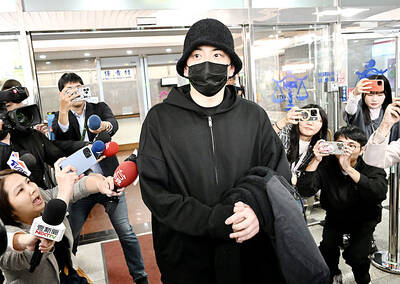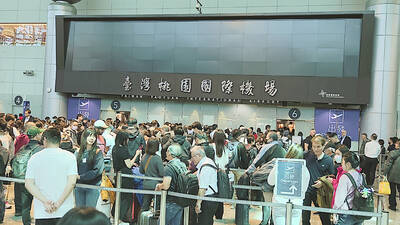As foreign media descend upon Taiwan ahead of the presidential and legislative elections, overseas coverage is likely to remain tightly focused on the country’s dealings with an increasingly bellicose China.
Taiwan Foreign Correspondents’ Club (TFCC) chairman Thompson Chau (周浩霖) in a recent interview said that international media would be most interested in knowing how the contenders for president plan to navigate the relationship with Beijing and Washington.
Democratic Progressive Party (DPP) presidential candidate Vice President William Lai (賴清德) has pledged to continue President Tsai Ing-wen’s (蔡英文) policy of emphasizing Taiwan’s sovereignty and seeking support from Washington and other democracies.

Photo: Reuters
Chinese Nationalist Party (KMT) presidential candidate Hou You-yi (侯友宜) is looking to adopt the approach of Tsai’s predecessor Ma Ying-jeou (馬英九), including promoting greater economic integration between Taiwan and China.
Taiwan People’s Party (TPP) presidential candidate Ko Wen-je (柯文哲) has said that while he would reference Tsai’s US and national defense policies, his policies on domestic affairs and cross-strait relations would be more moderate and rational if elected.
Chau said correspondents were paying close attention to the candidates’ proposals to boost the country’s defense capabilities as well as economic and energy security.
Many are also trying to grasp China’s disinformation operations, election meddling tactics and other coercive measures and how they might play out in Taiwan, said Chau, who covers Taiwan’s politics and defense for Nikkei Asia.
Kyodo News’ Taipei bureau chief Yasuhito Watanabe said he was watching closely if there would be a change in government, especially after eight years of DPP governance.
A victory for Lai would bring a third consecutive four-year term of a DPP president in office, unprecedented for any party in the Republic of China since the country held its first direct presidential election in 1996.
Jana Vaclavikova, a correspondent with Czech news Web site Aktualne, said that most voters she spoke to seemed more concerned with how the next president would tackle salary stagnation and spiraling rents than relations with China.
In contrast to the foreign media’s focus on cross-strait affairs, several correspondents noted that the Taiwanese public’s discontent with the DPP appeared driven more by domestic issues such as low wages, high house prices and a rising cost of living.
Bruno Kaufmann, a correspondent with Swiss public broadcaster SWI swissinfo.ch, said that these local issues, while certainly not unique to Taiwan, had become voters’ primary concern.
Danish reporter Alexander Sjoberg said that young people in Taiwan viewed the DPP government as having failed to adequately address these issues, despite crediting Tsai’s administration for progressive changes such as legalizing same-sex marriage in 2019.
A Hong Kong journalist who identified himself as “Paklam” said that the Taiwanese public pays more attention to the “day-to-day” problems of inflation and anemic wage growth than partisan political enmity between the DPP, KMT and TPP.
One topic that has gained attention among many Southeast Asian reporters has been the issues facing Taiwan’s about 740,000 migrant workers.
Aubrey Fanani, an Indonesian reporter working with IndosuarA, expressed hope for the candidates to propose solutions to the brokerage system problem in Taiwan, under which migrant workers are not allowed to change employers freely and are often burdened with exorbitant debts.
Amiel Reyes Pascual, a correspondent for the Philippines’ UNTV News and Rescue, said that viewers of the television network were interested in knowing how the next president would deal with issues related to migrant workers in Taiwan.
Hong Kong Journalists Association head Ronson Chan (陳朗昇) in October told Radio Free Asia that the journalist group might not arrange a delegation to Taiwan next month as it had done for past elections, citing concerns over tensions across the Taiwan Strait and the National Security Law in Hong Kong.
The legislation renders acts deemed by authorities as secession, subversion, terrorism and collusion punishable with a life sentence at the maximum, and has since its imposition in June 2020 led to the closure of several Hong Kong media firms critical of Beijing’s grip on the city.

The National Immigration Agency (NIA) said yesterday that it will revoke the dependent-based residence permit of a Chinese social media influencer who reportedly “openly advocated for [China’s] unification through military force” with Taiwan. The Chinese national, identified by her surname Liu (劉), will have her residence permit revoked in accordance with Article 14 of the “Measures for the permission of family- based residence, long-term residence and settlement of people from the Mainland Area in the Taiwan Area,” the NIA said in a news release. The agency explained it received reports that Liu made “unifying Taiwan through military force” statements on her online

A magnitude 5.7 earthquake struck off Taitung County at 1:09pm today, the Central Weather Administration (CWA) said. The hypocenter was 53km northeast of Taitung County Hall at a depth of 12.5km, CWA data showed. The intensity of the quake, which gauges the actual effect of a seismic event, measured 4 in Taitung County and Hualien County on Taiwan's seven-tier intensity scale, the data showed. The quake had an intensity of 3 in Nantou County, Chiayi County, Yunlin County, Kaohsiung and Tainan, the data showed. There were no immediate reports of damage following the quake.

Actor Darren Wang (王大陸) is to begin his one-year alternative military service tomorrow amid ongoing legal issues, the Ministry of the Interior said yesterday. Wang, who last month was released on bail of NT$150,000 (US$4,561) as he faces charges of allegedly attempting to evade military service and forging documents, has been ordered to report to Taipei Railway Station at 9am tomorrow, the Alternative Military Service Training and Management Center said. The 33-year-old would join about 1,300 other conscripts in the 263rd cohort of general alternative service for training at the Chenggong Ling camp in Taichung, a center official told reporters. Wang would first

MINOR DISRUPTION: The outage affected check-in and security screening, while passport control was done manually and runway operations continued unaffected The main departure hall and other parts of Terminal 2 at Taiwan Taoyuan International Airport lost power on Tuesday, causing confusion among passengers before electricity was fully restored more than an hour later. The outage, the cause of which is still being investigated, began at about midday and affected parts of Terminal 2, including the check-in gates, the security screening area and some duty-free shops. Parts of the terminal immediately activated backup power sources, while others remained dark until power was restored in some of the affected areas starting at 12:23pm. Power was fully restored at 1:13pm. Taoyuan International Airport Corp said in a